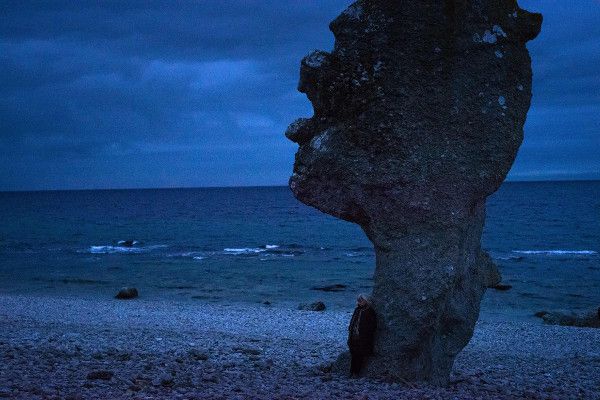Eye For Film >> Movies >> Searching For Ingmar Bergman (2018) Film Review
Searching For Ingmar Bergman
Reviewed by: Jennie Kermode

We begin with a beach. A beach, so Margarethe von Trotta tells us, that has been pivotal to her relationship with cinema. Most fans of Bergman's work will recognise it instantly: it is, of course, the principal setting for The Seventh Seal, and as well as providing an affectionate introduction to the subject of the film, it establishes its tone. Soon Von Trotta is walking through snow-streaked winter streets, among Medieval buildings framed by a lowering sky. Even in the way she frames her interviews, the character of Bergman is somehow present, as if he had personally selected her to tell the story of a life to which he paid limited attention as it flowed past.
The films had all of his attention. His compositional technique, his approach to actors, the exploratory nature of his work - all are examined here in course, the extent of his absorption becoming apparent in the process. Running parallel to this is another strand: the personal life that interested him only for as long as relationships remained in doubt. As an artist, he was fascinated by women's feelings about men, his male characters often unthinkingly callous or otherwise dangerous to those around them even when otherwise sympathetic. As a man, he married five times; footage from a reunion on his children (actually the first time some of them met), shows them clustered together on steps, some with greying hair, some still pubescent. He wasn't very interested in them; they learned not to be interested in him. This remoteness echoes the loneliness at the heart of many of his films, leaving one wondering if it was artistic distance that he mistook for the inevitable, cutting him off from the emotions he captured so well.

The list of interviewees is impressive. There's Liv Ullmann, of course, speaking about his work and its influence on her own with an enduring passion that is curiously absent when she discusses the man himself, though she shows no coldness towards him. There's Ruben Östlund, perhaps ready to be considered an heir; Olivier Assayas, Mia Hansen-Løve and Jean-Claude Carrière, their differing insights reflecting both the breadth of Bergman's oeuvre and the extent of his influence. Between them they dissect his acknowledged masterpieces, teasing out recurring themes and contributing personal stories that give the film an abstracted, poetic quality beyond its central academic focus. Again like Bergman's work, it might initially seem dry, but it's as rich in wit as it is in insight.
The latter part of the film, concerned with the filmmaker's legal troubles and declining health, is perhaps where things get interesting. Here we move beyond the conventional story of an artist who grows throughout his life, moving from one triumph to another, into something more complicated, troubling and artistically meaningful. Always introspective and troubled by doubt, Bergman in his later years began to reveal an erratic streak not previously seen, and it's here that we perhaps come closest to catching a glimpse of his humanity - here, where the curtain of his extraordinary productivity is drawn aside. His lifelong psychological insecurity itself comes to seem bound up in his process. His great admiration for actors hints at his own thwarted desires and his use of filmmaking as a form of therapy becomes ever more stark.
For all his undoubted brilliance, Bergman's work is something of an acquired taste - not every film lover can successfully connect with it. Where von Trotta triumphs is in creating a film - tribute, exploration, dissection - that hits the spot precisely for those most suited to enjoy and learn from his work. It's a piece both thorough and enchanting - and although some voices one might have hoped to hear within it are notably silent, it's a must for Bergman fans.
Reviewed on: 03 Nov 2018















